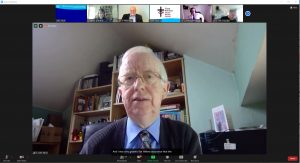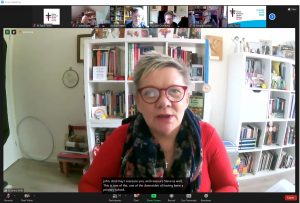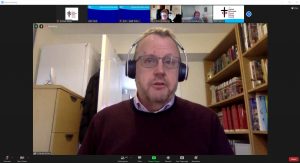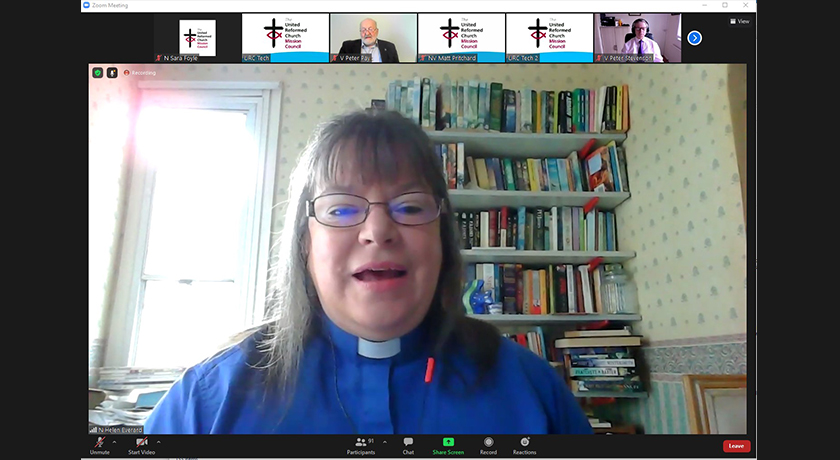Day two of the spring meeting of Mission Council was held digitally on 16 March.
Opening prayer and Bible study
The Revd Helen Everard, chaplain to the Moderators of General Assembly, led worship on the second morning of Mission Council. Rosie Martin, a member of the URC Equalities Committee, read from the story of the woman at the well in John chapter 4, and the Revd Samantha Sheehan, a special category minister working as a university chaplain in the Yorkshire Synod, offered a reflection on the passage.
Picking up on URC Youth’s 2021 theme of heroes and villains, Ms Sheehan said that we might respond to the Samaritan woman who met Jesus as a villain. We might assume that, coming to the well in the middle of the day, she is a woman of ill repute and judge her for that.
Such assumptions, however, said Ms Sheehan, are “smudges on our reading glasses”. If we remove them, we find this is not a story about a sinner challenged by Jesus and repenting. Rather, she is a strong woman who crosses boundaries to encounter Jesus, and this is a story about ‘what it is to be seen and fully known by God’. Finding that she is seen, the woman then invites others to see for themselves. And she sees who is before her – love incarnate in Jesus.
Ms Everard offered a challenge to Mission Council: “Who are the people in our society who are vilified, who come to the well in the middle of the day? Once we have seen them, how is God using them to bring light into dark places?” She concluded: “Because I am known by God I want to share that with other people.”
Session three
Paper G2: URC Future Pensions
Future pensions discussion – Paper G2
 The Pensions Committee and Finance Committee started a discussion at the Mission Council to help inform its approach about decisions being made at the General Assembly in July.
The Pensions Committee and Finance Committee started a discussion at the Mission Council to help inform its approach about decisions being made at the General Assembly in July.
John Piper, the URC’s Deputy Treasurer, began the discussions by saying that he was grateful that the Holy Spirit was with us the meeting, as mentioned during the opening worship.
He offered some reassurances: the URC pension schemes are now better funded now than before the global financial crash of 2008. And the challenges faced now are not because of anything the URC has done, but because the world of pension has changed.
If the General Assembly in July decides to explore possible changes to the schemes, that only affects the future – existing pensions are always guaranteed. The purpose of the discussion is to help us make the presentation to the General Assembly better.
In June 2020, Mission Council reaffirmed the Church’s commitment to provide good pensions to its ministers and staff.
Pension costs have risen substantially over the past 13 years because of low interest rates, and costs will rise further because of the Pensions Regulator’s requirement for increased cautiousness. This in turn raises questions about affordability and value for money. And any change would only affect the future growth of pensions.
Pensions already earned from past service are legally protected and changing pension arrangements is complex and costly, so the committees are taking these discussions one step at a time, paper G2 said.
No recommendations about future pension arrangements were included in the paper but it laid out the issues before the Church along with estimated costs and benefits of alternative pensions provision.
Mr Piper explained that the estimated contributions with the existing schemes could rise to 38.2% in 2030, some £3.6m, up from 12.3%, £1.1m, in 2010. This is because lower risk investments are now needed and other factors.
Different schemes
Both the existing pension schemes for ministers and lay staff are Defined Benefit (DB) schemes. This means that the method of calculating the pension payable is pre-determined.
The main alternative to a DB arrangement is a Defined Contribution (DC) pension scheme, which would also be managed by a trust company. Here, the levels of contributions by the Church and members are fixed (but may be changed after due notice). These contributions are invested on behalf of the members. At retirement, each member has a pension pot which is used to pay them a pension.
The pension schemes of other denominations were also shared in the report.
- The Church of England has a relatively new DB arrangement for clergy but not for lay staff who have switched to DC.
- The Methodist Church has a DB scheme for ministers but have just closed their staff DB scheme to future accrual and are putting a DC plan in place.
- The Baptist Union closed all DB schemes and only offers a DC scheme, the Congregational Federation only offers DC as does the Church of Scotland
- The Salvation Army has a DB arrangement for officers but DC otherwise. The DC scheme offers a range of options to staff.
After seeing a number of comparisons of the existing pension scheme and potential alternatives when applied to different people – a 28-year-old just entering stipendiary ministry, a 43-year-old with 15 years of past service and a 58-year-old with 30 years of service – the meeting broke into discussion groups.
Session four
Feedback from groupwork on future pensions
In the following plenary session, Sam Richards, as a group reporter, asked how the General Assembly would engage with the discussion, and her group suggested a pre-recorded presentation for the meeting for representatives and Synods to use before the paper is presented in July.
Andrew Prasad said that a holistic approach is talked about in the URC but not always achieved. We’re not always encouraged enough to take responsibility and we should be better prepared.
Graham Hoslett said that his group reflected that the same stipend is received by ministers and going to a defined contributions scheme could mean ministers could go from a fixed scheme to one which is variable. John Piper’s presentation at the last Mission Council was superb and a similar presentation would help, as would pre-Synod discussions with the Synod Treasurer.
Geoffrey Clarke said learning styles are different and also suggested a video presentation.
George Watt said that the Pension Wise website is a good resource and his group wondered whether the topic was too big for General Assembly, and if a sub-group could do some of the leg work before the meeting.
 Jenny Mills said her group felt sustainability was important as was pastoral care. Retirement age was not mentioned in the paper which could help with some focus. The projections should also include those who come to ministry later in their careers, and that there are varying degrees of understanding on complex issues.
Jenny Mills said her group felt sustainability was important as was pastoral care. Retirement age was not mentioned in the paper which could help with some focus. The projections should also include those who come to ministry later in their careers, and that there are varying degrees of understanding on complex issues.
Victoria Turner said the moral responsibility should be more visible. The URC has a duty to protect its ministers and so should some sort of ‘safety blanket’ be deployed so that it’s not all down to individual responsibility.
Russell Furley-Smith asked if all serving stipendiary ministers should be consulted as stakeholders in the pension scheme.
John Piper replied by saying that consultations will take place, as required by law, once decisions whether or not to explore possible ways forward are taken.
Paper D/H1: Marks of ministry of a worship leader and lay preacher
Paul Whittle, convenor of the Ministries Committee, opened by saying the URC was richly blessed by worship leaders and lay preachers, further evidenced by those interested in the role at a recent enquirers’ conference.
The paper was a concise and comprehensive description of what the United Reformed Church can reasonably expect of people who are called to those roles.
The expectations of ministers, agreed in 2019, had been revised after much consultation specifically for Worship Leaders and Lay Preachers.
Two benefits came with the amendments – ecumenical clarity and that they had come from the grass roots with contributions from the 13 Synod Lay Preaching Commissioners who are passionate about supporting them in their ministry.
Further work is needed, Mr Whittle added, with tying in D/H1 and D/H2, the process for becoming a Worship leader or Lay Preacher, together.
The marks that were adopted said that both Worship Leaders and Lay Preachers in the URC seek to be: a faithful disciple of Jesus Christ; a person of accountability; a crafter of worship; a preacher; a lifelong learner; a contextual theologian; a pastor; a public figure; and a reformer.
The full paper with explanations and notes for each mark can be found here.
Paper D/H2: Worship Leaders and Lay Preachers
Alan Yates, convenor of the education and learning committee, presented paper D/H2 proposing a new process for becoming a worship leader or lay preacher in the URC. Mr Yates said this was the third time he had brought a paper on this subject to Mission Council, but this was a very different proposal, following work with the ministries committee and wider listening.
Mr Yates reminded Mission Council that the decision to end the Training for Learning and Service programme created a need for training in the different and complimentary ministries of worship leading and lay preaching. Paper D/H2 sets out proposals for the recognition of these ministries, with training through the Stepwise programme, or local synod schemes. Mr Yates asked Mission Council for high level guidance, which would result in the ministries and education and learning committees bringing a paper to General Assembly.
Mission Council was receptive to the proposals. Points which came out of the ensuing discussion included the following: the proposed process is not meant to be a requirement for all those leading worship or preaching in the URC, especially not those already doing so; it would be beneficial to include teaching on the use of technology, on racism and white privilege, and on personal reflection; the importance of safeguarding and DBS checks needs to be taken very seriously. It was also explained that the progression set out in appendix 1, paragraph 5 of the paper is intended as an example of the kind of development a person might go through and not meant to be a hierarchy of ministries.
The resolution was carried by large majority and the Moderator, the Revd Clare Downing, said she looked forward to seeing what the committees brought in next stage.
Safeguarding update
The Revd Dr John Bradbury updated Mission Council on several developments that have taken place within the safeguarding department at Church House. Since taking up the role of General Secretary, John also took on the responsibility for Acting Deputy General Secretary (Discipleship) due to a lack of a suitable candidate being recruited to the role.
John quickly became concerned that major issues needed addressing, in particular governance. For example, it was unclear where authority comes from in the URC’s conciliar structure in regard to the actions that Church needs to take. Acting as Deputy General took up a lot of John’s time, given his other responsibilities, and it wasn’t tenable to continue. To address this, the Revd Adrian Bulley was seconded from the National Synod of Wales on a part-time basis. John expressed sincere gratitude to synod for allowing Adrian to split his time on a 50% basis to work in this way. Adrian began his work with Church House in January and will continue through to July. A new Deputy General Secretary for Disciple will hopefully be appointed. John also thanked Adrian for the efficiency and knowledge he brings to the role.
John thanked Penny McGee, the URC Safeguarding Training and Development Coordinator who joined the URC in lockdown. Penny, John said, became a trusted and respected colleague by many who developed much useful content. However, Penny handed in her notice in February and left in earlier this month to return to social work which is close to her heart. Gratitude was expressed for Penny’s work and well wishes sent her way for the future.
Thanks, were also given to Ioannis Athanasiou, URC Safeguarding Adviser, who has ceased being employed by the Church by mutual agreement.
At present, there are no safeguarding experts working at a General Assembly level of church life. Sharon Barr, Wessex Synod Safeguarding Adviser, is working four hours a week on essential safeguarding matters so that decisions can be made at Church House.
 It is hoped that a recruitment drive will shortly begin to fill the vacancy for a Safeguarding Advisor as it is vital that safeguarding becomes an integral part of who the URC is and operates at all levels of the church.
It is hoped that a recruitment drive will shortly begin to fill the vacancy for a Safeguarding Advisor as it is vital that safeguarding becomes an integral part of who the URC is and operates at all levels of the church.
Adrian then outlined the main points in addressing the governance issues, and the three things planned to bring to General Assembly, that are separate but complimentary.
1. Despite good practice and safeguarding General Assembly has never approved a safeguarding policy statement. The aim is to remedy that in July about why safeguarding is an important responsibility for all, in order to keep everyone safe. This will be worked out through a series of commitments.
2. Safeguarding is not mentioned in the structure of the Church. The aim is to propose an additional function for each council of the Church so that safeguarding is foundational in the URC’s journey to becoming a safer denomination, and responsibility for that outlined in the actions that need to be taken.
3. The advisory group is to be replaced by a safeguarding committee which will serve to ensure safeguarding is always front and centre.
Reporting by Steve Tomkins, Andy Jackson, and Ann-Marie Nye

